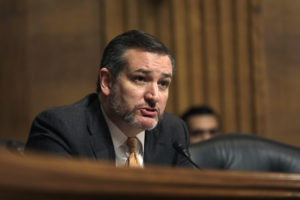
Sen Ted Cruz (TX) questions the panel as United States Border Patrol Chief Carla L. Provost delivers testimony on immigration policy before the Senate Judiciary Committee, Subcommittee on Border Security and Immigration, in Washington, D.C., Dec. 12, 2018. U.S. Customs and Border Protection Photo by Glenn Fawcett
Sen. Ted Cruz (TX) and Dem. Rep AOC are united in their disfavor of former members of Congress becoming lobbyists.
In a recent Gallup poll, the only group worse than Congress (20% approval rating) to the public was lobbyists (6%).
Kyle Sammin reports in The Federalist that the only other group outside of Congress that polled as less ethical were lobbyists.
Lobbyists Not Dissimilar to Lawyers
,,, the ones representing my interests are crusaders for justice, brave and honest men and women who boldly speak the truth to power. In our minds, it’s always the other guy’s lawyer or the other side’s lobbyist who give them all a bad name.
It’s not easy to think of lobbyists or congressmen as downtrodden people in need of protection. And it is easy to forget in the heat of battle that the rights protected in the Constitution are not just for the weak.
Even Lobbyists Are Protected Under the 1st
Under two sections of the 1st Amendment, the right to free speech and the right to petition the government for the redress of grievances are covered.
As a matter of basic free speech, the proposed ban is already a problem. What a lobbyist does is essentially free speech in action, and not just any speech but political speech, the sort of speech that is necessary for a self-governing people.
Companies, unions, and advocacy groups hire lobbyists to talk to government officials about public policy.
Their goal is to convince those officials that their client’s view of things is correct, and that some law should be altered (or not altered) in accordance with that view.
If rights are guaranteed by the Constitution, limiting them requires a constitutional amendment. The Democrats acknowledged this when they voted (unsuccessfully) to reduce the free speech and free press protections of the First Amendment in order to overturn Citizens United v. FEC, a 2010 censorship case. Reducing the right to petition the government would require the same effort. Fortunately, respect for the Bill of Rights has become sufficiently ingrained in our culture that the thought of repealing it, even in part, gives most Americans pause.
Two Classes of Americans?
Limiting those rights in the way Ocasio-Cortez and Cruz propose is especially troublesome because it creates two classes of Americans: one who may petition the government, and one who may not. We have seen examples of this kind of thinking before, but none have made their way into law.
It brings to mind the Eighteenth Amendment, which allowed Congress to ban alcohol, and the Volstead Act, which actually banned it. The wording of the amendment is simple, the legislation that followed was more complex. Exceptions were made, loopholes exploited, and enforcement was nearly impossible. To the extent it was enforced, the Volstead Act created the first stirrings of the big government police state that we now see spread to other areas of the law.
Do Americans want snoops and spies following ex-congressmen to meetings, listening to phone calls, reading emails? The would-be Ocasio-Cortez-Cruz Act would require such activities.
The disclosures required by current law (the Lobbying Disclosure Act), passed in 1995, are a much better solution. People should be allowed to talk about whatever they want.
Read more here.
If you’re willing to fight for Main Street America, click here to sign up for the Richardcyoung.com free weekly email.




